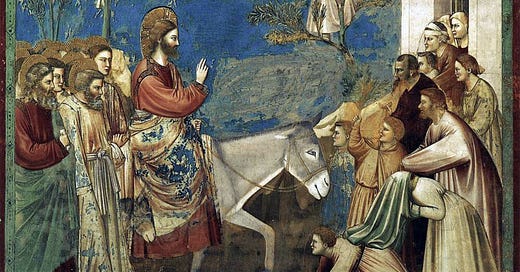We love shortcuts.
Fast-forward buttons. Express lanes. Quick results. Our entire culture celebrates efficiency, minimizing discomfort, and skipping straight to the good part.
Is it any wonder we approach Holy Week the same way?
Palm Sunday and Easter bookend this sacred week with celebration. We love the triumphal entry—children waving palm branches, songs of praise, the arrival of the King. We love even more the empty tomb—victory over death, promises fulfilled, darkness defeated.
It's the middle we'd rather skip.
The betrayal. The denial. The abandonment. The torture. The cross. The silence of Saturday.
As I prepare for Palm Sunday, I feel that familiar pull—the desire to rush through the darkness and land safely on the far shore of resurrection morning. To jump from hosannas to hallelujahs without the haunting stations in between.
But what if, in our hurry to skip to the good part, we're missing the very heart of our faith?
What if the parts we're most eager to avoid are precisely where God is most powerfully revealed?
This week, there's a heaviness I can't shake. Because I know where this story leads. Because triumph gives way to torture in just five days. Because the voices shouting "Hosanna!" will soon scream "Crucify him!"
This tension—holding celebration and coming catastrophe simultaneously—is the heart of Holy Week.
Most of my life, I knew only two important days on the church calendar: Christmas, and Easter. The rest seemed optional. Catholic, even. I was wrong.
Holy Week invites us to stand in that threshold between old creation and new, between what was and what will be. The place where transformation becomes possible.
Consider what awaits us:
On Palm Sunday, two processions enter Jerusalem. From the west comes Pilate with soldiers and imperial banners—power on display. From the east comes Jesus on a borrowed donkey. Two visions of power collide. Neither wins in the way we expect.
On Maundy Thursday, the God who spoke galaxies into existence kneels with a basin and towel. The Master becomes servant. Power redefined.
Good Friday strips everything away. A man hanging naked. Body broken. Abandoned by friends. Seemingly forsaken by God.
I want to look away. I force myself to stay. To witness. To remember that this is what love costs.
I've sanitized this story. I've hung crosses on my walls. I've worn them around my neck. I've polished away the blood and scandal until it's comfortable.
But in the ancient world, wearing a cross would be like wearing a tiny electric chair as jewelry. The cross was where Rome displayed its power over broken bodies. It was designed to humiliate.
And yet Martin Luther, in his theology of the cross, insisted that it is precisely here—in suffering, weakness, and apparent defeat—that God is most fully revealed. "He who does not know Christ does not know God hidden in suffering," Luther wrote. "God is to be found in suffering and the cross."
When we sanitize the cross, we sanitize God. We create a deity distant from pain. But the cross reveals a God who enters fully into our brokenness. Who tastes our tears. Who knows our pain from the inside.
I need this God. Not a God who remains distant and clean. But a God who enters my pain and transforms it from within.
Holy Saturday lingers in profound silence. The day when God lies dead in darkness. We don't know what to do with this day. We rush past it, eager for Sunday's celebration.
But Saturday is where most of us live. In the silence after tragedy. In the space between what was and what will be. In the tomb-time when God seems absent.
Saturday teaches us to wait. To hope when hope seems foolish.
Then Easter dawns. The firstfruits of new creation burst forth. Death defeated. Yet even Easter contains tension. Mary mistakes Jesus for a gardener. The disciples lock themselves away in fear.
New creation doesn't arrive all at once. It begins as a whisper. A rumor. A glimpse.
We still live between the D-Day of Easter and the V-Day of Christ's return. The decisive battle won. The war not yet over.
As this Holy Week approaches, I don’t want to be a spectator. Or watch from a safe distance. Holy Week demands participation.
To have my feet washed and to wash others'. To stand at the cross when others flee. To wait in Saturday's silence. To run to the tomb with wonder and disbelief.
The days of Holy Week help us remain fixated on Jesus. That's something I desperately need. Something that turns my gaze away from all the other things I tend to fixate on.
Holy Week is a big deal.
Not because of the pageantry. Because here, in these seven days, we see most clearly who God is, who we are, and what love requires.
As you prepare for Holy Week, let yourself feel the tension. Stand in that liminal world with holy expectation. Enter fully into the week that changed everything.
For in Holy Week, we don't just commemorate history. We join the story that is still unfolding. Still transforming. Still making all things new.
And the good part—the resurrection—is only truly good when we've walked through the darkness to reach it. Don’t just skip to the good part.
Image: Ray Downing




Thank you for this wonderful reminder.
Beautiful 🙏🏼